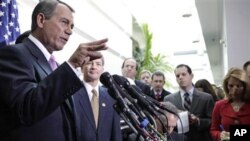The new Republican majority in the U.S. House of Representatives approved a symbolic resolution on Tuesday to roll back domestic federal spending to levels before Barack Obama was elected president in 2008. The vote was 256 in favor to 165 against. The vote came only hours before the president heads to Congress to deliver the annual State of the Union address to a joint session of the legislature.
The non-binding resolution promises spending cuts of about 20 percent from current levels on non-defense federal agencies when Congress votes on the actual, long overdue budget for the current fiscal year. The sponsor of the measure, Republican Congressman David Dreier of California, said this is the first step in a long process for Congress to have an open discussion about the budget.
"One of the things that is critically important for us to do is to begin getting our fiscal house in order,” Dreir stated. “So that that will provide an incentive for job creation and economic growth."
|
STATE OF THE UNION TRIVIA |
|
Did you Know?
|
Democratic lawmakers criticized Republicans for bringing a spending bill to the floor that does not specify which federal agencies and programs they want to cut. Democratic Congressman Rob Andrews of New Jersey says, "The minority does not want to grapple with that problem, which is why there are no amendments made in order, no numbers in the bill and no reason to vote for this amendment."
Some Democrats accused Republicans of holding the vote on the day of the State of the Union speech to upstage President Obama. Analyst Joe Schatz of Congressional Quarterly said Republicans certainly did want to send the president a message.
"It is a symbolic vote, I mean it is not a binding vote, it is symbolic to have it on the day that he comes down to Capitol Hill to announce his plans,” Schatz explains. “It is a sort of a shot across the bow, an effort to show the president that there is a new majority in town."
The actual House Republican budget cuts will be made in a follow-up bill that is likely to face fierce opposition from the Democratic-controlled Senate and White House. Republicans say this is a first step towards keeping campaign promises to cut $100 billion from the current budget. Democrats argue that when it comes down to actually cutting the budget so drastically, popular programs such as federally-funded cancer research and the number of federal law enforcement agents will also be affected.
In his State of the Union address, President Obama is expected to call for government investment in education and infrastructure so that the United States can remain competitive with other countries. But analyst Joe Schatz says he is likely to face a wall of opposition from the Republican-controlled House. "Right now, sort of a lot of incoming Republican freshmen don't have a whole lot of appetite to compromise on spending, having made a lot of promises to cut spending on the campaign trail," he said.
Some Republicans are calling for even more drastic cuts in spending than 20 percent. And some lawmakers from both parties, such as Republican Representative John Duncan of Tennessee, are arguing that U.S. military and security spending should not be exempt from budget cuts.
"More importantly, I want to add my voice to the growing chorus that is saying loud and clear that nothing should be left off the table. There is waste in every federal department and agency, and the waste in the Defense and Homeland Security Departments is huge,” he said. “No department should be given a free pass and made exempt from cost-savings and belt-tightening. We have a national debt of over $14 trillion, a mind-boggling, incomprehensible figure.
President Obama is expected to balance his calls for government investment in infrastructure and education with promises to cut spending elsewhere, but congressional Republicans may prove to be a tough audience.




